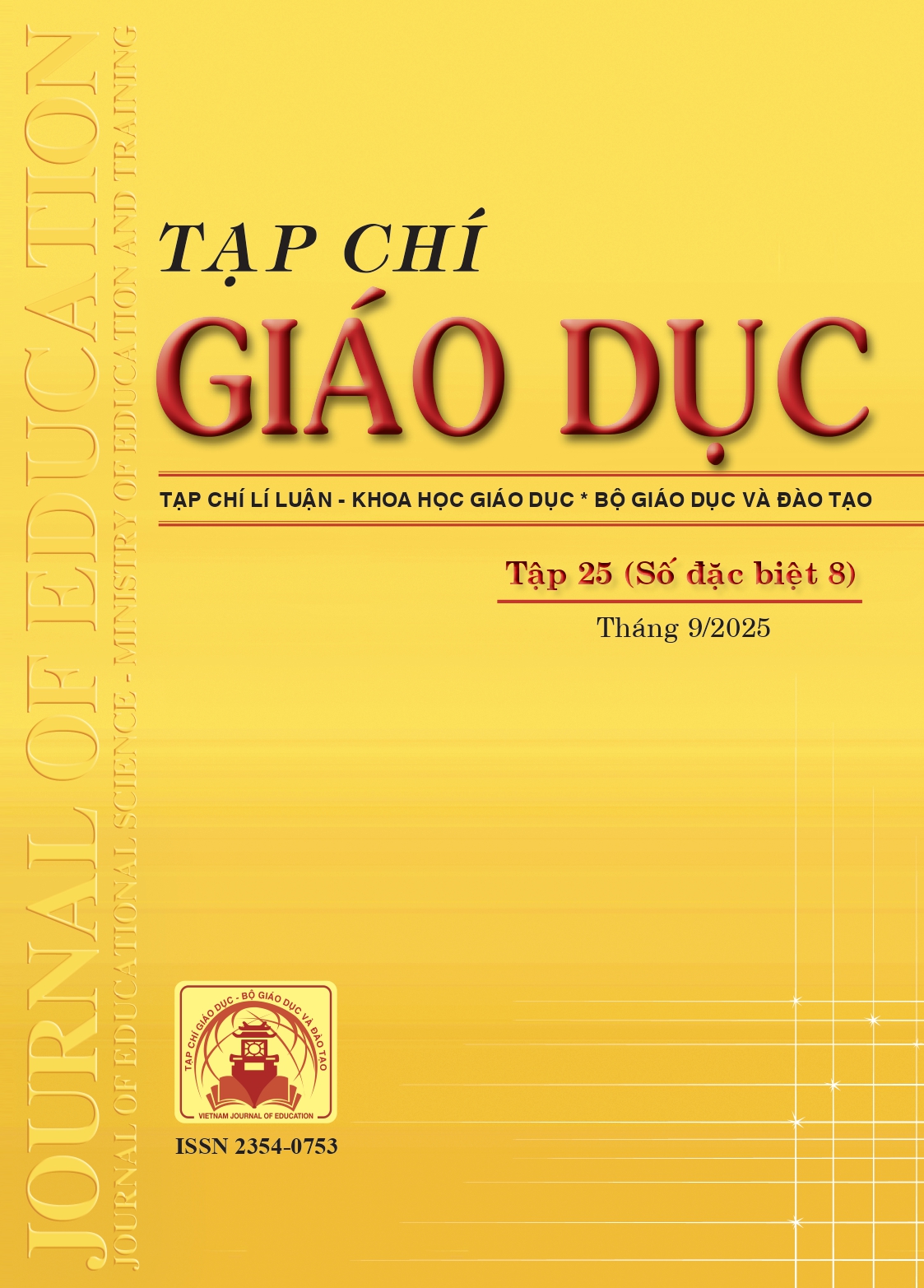Đề xuất quy trình tổ chức hoạt động dạy học nhằm phát triển năng lực số cho học sinh trung học phổ thông: Thử nghiệm bước đầu trong môn Toán
Tóm tắt
In the context of rapid digital transformation, digital competence has become a core skill that needs to be developed throughout general education. Aligned with the orientation of the 2018 General Education Curriculum and Circular No. 02/2025/TT-BGDĐT, this study aims to design a teaching activity organization process that integrates the development of digital competence for high school students. Based on an analysis of theoretical documents and current educational policies, the authors propose a five-step process that can be flexibly adapted to different subjects and classroom contexts. Initial implementation in mathematics teaching shows the process is feasible and effective in fostering component competencies as regulated. The study recommends further piloting across various subjects to refine and expand its application in general education.
Tài liệu tham khảo
Anisimova, T., Ganeeva, A., & Sharafeeva, L. (2021). Development of Digital Skills and Engineering Thinking in Students as Part of the Digital Summer Project. International Journal of Engineering Pedagogy (IJEP), 11(2), 69. https://doi.org/10.3991/ijep.v11i2.17215
Bộ GD-ĐT (2018). Chương trình giáo dục phổ thông môn Khoa học Tự nhiên (ban hành kèm theo Thông tư số 32/2018/TT-BGDĐT ngày 26/12/2018 của Bộ trưởng Bộ GD-ĐT).
Bộ GD-ĐT (2025). Thông tư số 02/2025/TT-BGDĐT quy định Khung năng lực số cho người học.
Carretero, S., & Urban, T. K. (2017). DigComp 2.1. The Digital Competence Framework for Citizens. With eight proficiency levels and examples of use. Publications Office of the European Union.
Đỗ Văn Hùng (chủ biên, 2022). Năng lực số - Khung năng lực số dành cho sinh viên. NXB Đại học Quốc gia Hà Nội.
Hamilton, E. R., Rosenberg, J. M., & Akcaoglu, M. (2016). The Substitution Augmentation Modification Redefinition (SAMR) Model: a Critical Review and Suggestions for its Use. TechTrends, 60(5), 433-441. https://doi.org/10.1007/s11528-016-0091-y
Ilomäki, L., Paavola, S., Lakkala, M., & Kantosalo, A. (2016). Digital competence-an emergent boundary concept for policy and educational research. Education and Information Technologies, 21, 655-679.
Law, N., Woo, D., de la Torre, J., & Wong, G. (2018). A Global Framework of Reference on Digital Literacy Skills for Indicator 4.4.2. Information Paper No51, 51.
Lê Anh Vinh, Bùi Diệu Quỳnh, Đỗ Đức Lân, Đào Thái Lai, Tạ Ngọc Trí (2021). Xây dựng khung năng lực số cho học sinh phổ thông Việt Nam. Tạp chí Khoa học Giáo dục Việt Nam, số đặc biệt tháng 01/2021, 1-11.
Lê Thái Hưng, Nguyễn Thị Hạnh, Vũ Phương Liên (2022). Nghiên cứu và đề xuất khung năng lực số của học sinh trung học cơ sở trong học tập trực tuyến. Tạp chí Giáo dục, 22(19), 19-24.
López García, C., Sánchez Gómez, M. C., & García-Valcárcel Muñoz-Repiso, A. (2022). Development of Digital Competence in primary and secondary students in three dimensions: fluency, learning-knowledge and digital citizenship. RISTI - Revista Iberica de Sistemas e Tecnologias de Informacao, 2022(E48), 501-517.
Redecker, C. (2017). European framework for the digital competence of educators: DigCompEdu. In Joint Research Centre (JRC) Science for Policy report. https://doi.org/10.2760/159770
Shin, T. S., Hwang, H., Park, J., Teng, J. X., Dang, T. (2019). Digital kids Asia-Pacific: insights into children’s digital citizenship. UNESCO Bangkok Office.
Trịnh Thị Phương Thảo, Hứa Thị Toàn, Lê Thị Diễm Quỳnh. (2025). Đề xuất quy trình xây dựng kế hoạch bài dạy nhằm phát triển năng lực số cho học sinh trung học phổ thông. Tạp chí Khoa học, Đại học Thái Nguyên, 230(04), 29-36.
Trịnh Thị Phương Thảo, Trịnh Thanh Hải, Lê Minh Cường, Đỗ Bảo Châu, Trần Trung (2024). Năng lực số của học sinh trung học phổ thông ở Việt Nam. Tạp chí Giáo dục, 24(6), 6-11.
Vuorikari, R., Kluzer, S., & Punie, Y. (2022). DigComp 2.2: The Digital Competence Framework for Citizens. EUR 31006 EN, Publications Office of the European Union, Luxembourg, 2022, ISBN 978-92-76-48882-8, https://doi.org/10.2760/115376
, JRC128415).
Đã Xuất bản
Cách trích dẫn
Số
Chuyên mục
Giấy phép

Tác phẩm này được cấp phép theo Ghi nhận tác giả của Creative Commons Giấy phép quốc tế 4.0 .












